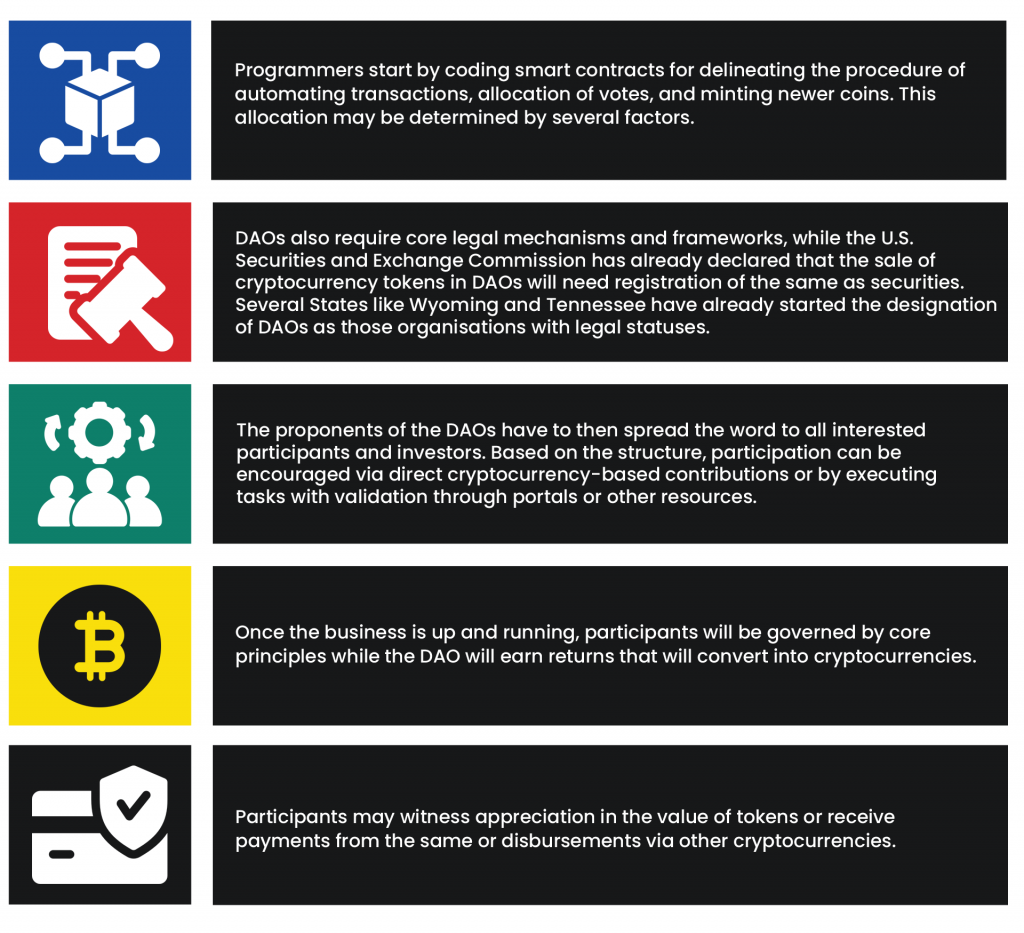
Decentralised autonomous organisations (DAOs) have been making waves lately, throughout the technology spectrum. DAOs are specific management structures leveraging blockchain technologies for automating a few aspects of transaction processing and voting. There is no central legal entity involved in decentralised autonomous organisations (DAOs) that holds responsibility for the regulation of the projects.
There is smooth governance and transparency ensured through the decentralisation mechanism and distributed ledger technology. Smart contracts are made and tested for ensuring that vital details are not missed. Tokens are used as incentives for all validators in DAOs, ensuring their active, swift, and fair participation. DAOs have wide applications throughout the blockchain, including cryptocurrencies and Web 3.0 which is the proposed new-generation web architecture driven by decentralisation.
The future blueprint here is that decentralised autonomous organisations or DAOs may enable easier creation of decentralised entities that respect stakeholder interests outside any one party’s control. They may be used for raise funds for specific purposes/projects while forming newer business mechanisms.
They may also enable future automation of several financial steps and processes on blockchain platforms, making sure that stakeholders get compensation as per universally-agreed rules, while automating shared votes based on specific support, investment levels, or even engagement.
Many industry players feel that decentralised autonomous organisations or DAOs may eventually replace the inherent trust quotient in personal ties or with central authorities through specially-made blockchain smart contracts. DAOs may also automate a model where every stakeholder gets adequate compensation and a long-term project stake. Here are a few key points worth noting in this regard:


However, there are a few disadvantages of decentralised autonomous organisations or DAOs. Automated smart contracts may be hard to tweak whenever any problem is found, while hackers may also find some loopholes for the illegal misappropriation of funds against stakeholder interests.
Participants may also shell out higher transaction charges for every transaction, while human intervention will also be necessary for the implementation of legal and physical procedures. The legal applicability and status of DAOs is still being understood by global authorities, which mean current risks for all investors.
DAOs are still in their infancy. In the short term, they could have a major effect on overall fundraising for particular projects/objectives. Several services that promote causes will find them effective in the near future, enabling voting by participants alongside. DAOs may also enable newer investment entities while automating the procedure of returning money to all participants.
DAOs may eventually help establish decentralised business models for support and investments alike. Participants may get tokens for their support and long-term stake in any venture. It is early days as of yet, although DAOs could well transform into some of the most exciting future trends.
DAOs ensure automated procedural efficiency along with higher transparency and the absence of any central authority. It will enable swifter fundraising while enabling streamlined distribution of incentives/rewards/returns simultaneously.
The first U.S. State to legally recognise DAOs was Wyoming in 2021. They were recognised as limited liability companies, giving them a defined corporate structure and legal protection. Some other States are also considering the legalities of DAOs, while they are also attaining legal status in several other countries.
DAOs are still works in progress, with several authorities yet to recognise them legally. This presents risks for participants, including personal liability. Any DAO participant may be liable for any action taken by an organisation, even when it was not personally authorised by him/her.
Any traditional organisation has its own centralised and legal entity. This is absent in a decentralised autonomous organisation (DAO).